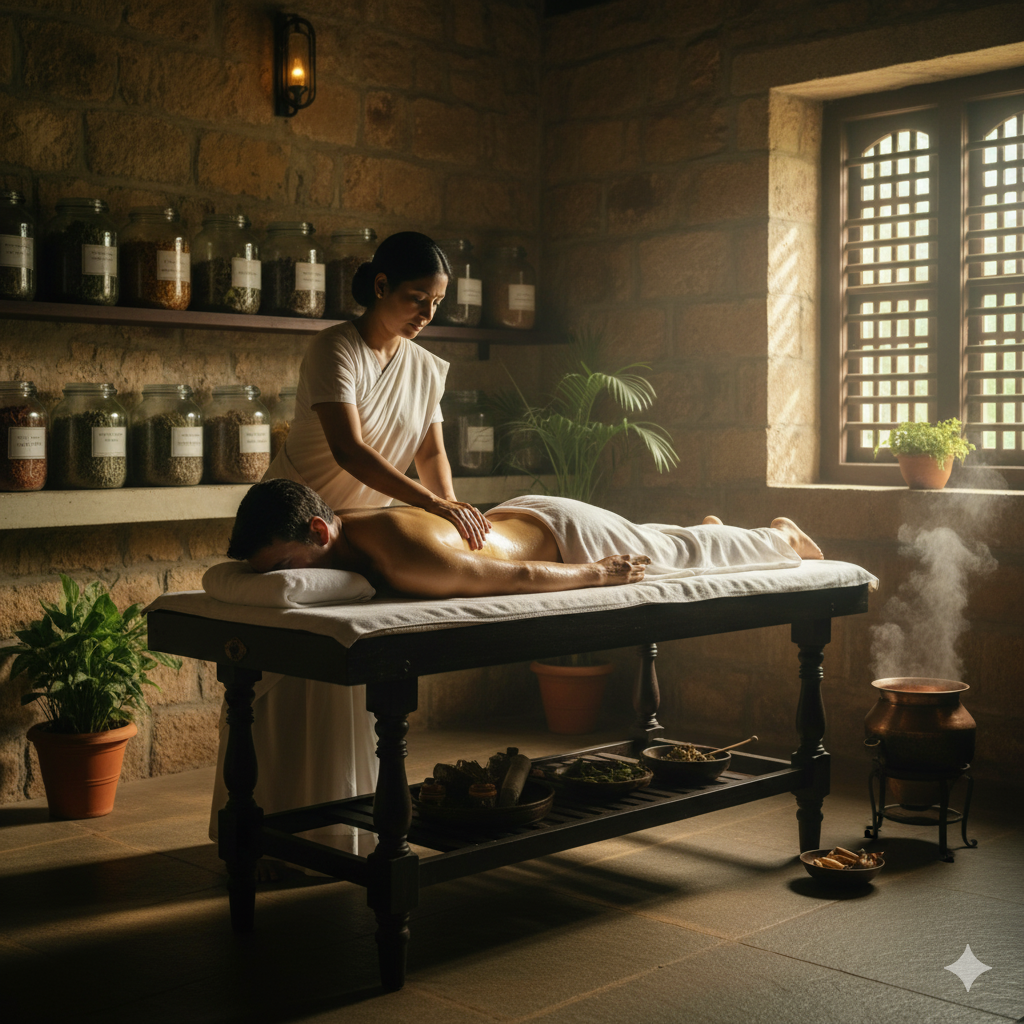Panchakarma
Ayurveda’s Complete Detoxification and Cleansing
Panchakarma is one of Ayurveda’s most important purification and healing systems. The word Panchakarma means “five actions” or “five therapies.” These treatments are designed to eliminate toxins, remove deep-rooted stress, and restore balance to the doshas (the energies that govern all biological functions).
The five therapies are: Vamana, Virechana, Nasya, Vasti, and Rakta Moksham. Together, they rejuvenate the body, mind, and spirit.
Panchakarma Diet
For Panchakarma to be effective, it must be supported by a special detox diet. At Al shifa Naturopathy Ayurvedic Hospital, we give utmost importance to this. Every patient undergoing Panchakarma is provided with a personalized diet plan, carefully monitored by our doctors on a daily basis. This diet enhances the cleansing process and strengthens digestion.
Steps in Panchakarma
Panchakarma is a five-fold therapy; it is highly personalized based on the needs of the individual depending on the body type, dosha imbalances etc. Usually, only parts of the five therapies are needed.
- Vamana (Therapeutic Emesis)
- Virechana (Purgation Therapy)
- Vasti (Medicated Enema)
- Nasya (Nasal therapy)
- Rakta Moksham (Blood Cleansing)

Vamana is a medicated emesis therapy that eliminates excess Kapha toxins from the stomach and respiratory tract. It is especially suited for those with high Kapha imbalances. The treatment involves mobilizing and expelling toxins through controlled vomiting.
Benefits: Effective for bronchial asthma, chronic allergies, hay fever, vitiligo, psoriasis, hyperacidity, chronic indigestion, nasal congestion, edema, obesity, psychological disorders, and skin diseases.
Virechana is a controlled purgation therapy that removes accumulated Pitta toxins from the liver and gallbladder, cleansing the entire gastrointestinal tract. It is considered safe and free of side effects when performed under supervision.
Benefits: Helpful in chronic fever, diabetes, asthma, digestive disorders, constipation, hyperacidity, vitiligo, psoriasis, headaches, joint disorders, gynecological conditions, elephantiasis, paraplegia, hemiplegia, and skin problems such as herpes
Vasti is known as the “mother of all Panchakarma treatments” because it works on all three doshas—Vata, Pitta, and Kapha. Medicated oils, ghee, or herbal decoctions are administered through the colon to cleanse accumulated toxins, rejuvenate the system, and strengthen colon health. The treatment plan varies depending on the individual’s medical condition.
Types of Vasti:
Benefits: Supports digestion, relieves constipation, strengthens immunity, improves joint health, balances Vata disorders, and promotes overall rejuvenation.
In Nasya, medicated oils or herbal preparations are administered through the nostrils to clear excess Kapha toxins from the head and neck region. Depending on the condition, this therapy can be continued for several days.
Benefits: Improves memory, eyesight, voice clarity, and sleep. Effective in sinusitis, migraines, nasal allergies, nasal polyps, stiffness of the neck, frozen shoulder, trigeminal neuralgia, Bell’s palsy, neurological disorders, premature greying of hair, hyperpigmentation on the face, headaches, and loss of smell or taste
Rakta Moksham is a blood purification therapy advised in specific conditions. It removes toxins from the bloodstream and is performed using different methods under medical supervision.
Methods include:
Benefits: Useful for skin disorders, joint and musculoskeletal problems, varicose veins, hemorrhoids, eye diseases, hypertension, and certain cardiovascular conditions.

